Winter Solstice dealt a hard moment of self-awareness: I have a stunning lack of resilience.
For two decades I’ve cultivated toughness, but toughness and resilience are not the same. In the past, I would have defined their differences as subtle, but now I see that they are stark. What helped me realize this was losing the tough thing I’d planned to do over the holidays and falling apart because I lacked the resilience to let go.
Winter Solstice was the day we were set to leave for Alaska. Amid my mental health struggles in October and November, I clung to comforting daydreams about dragging my sled through the frozen stillness, with a silence so clear and deep that one can hear the faint wing beats of nearby chickadees. Sometimes I catch a glimpse of these tiny birds foraging through the snow — the only animal moving when it’s 40 below. When I see a chickadee, I’m always struck with reverence … and envy. What a life, to remain in constant motion just to survive. They forage all day and shiver all night. In the face of slim odds, they thrive.
As the trip drew closer and the forecast called for colder and windier conditions, I only grew more excited. There was a good chance it was going to be 30 below with 25 mph winds. In such weather, the most any animal can achieve is to survive. Out there, all of my midlife crisis bullshit wouldn’t matter. I wouldn't have to endure my regular life of slogging through day after tedious day with a growing base of self-loathing and fading convictions about passions and purpose. Out in the roaring white silence, I would simply be a warm animal, one whose only job was to stay warm. I would wrap my body in a shield of its own heat and work hard to keep the furnace burning. I wouldn’t do this because I am tough; I would do it because I am soft and frightened. I am too tired for the life of a human being; I would like to be a black-capped chickadee.
Just a couple of hours before we were set to leave, Beat called out that Alaska Air had canceled our flight. You may remember the Arctic Blast that hit most of the Lower 48 just before Christmas. Seattle was buried in several inches of snow. The cold air was barreling toward Denver. There wasn’t another flight available for three days. We’d have to cancel our first cabin trip, and did we really want to battle backed-up air travel on Christmas Eve? What if our return trip was equally affected? Conceding to the nightmare that travel has become in recent years, we canceled the entire trip.
“Doesn’t it seem like, since 2020, we can no longer have nice things?” I lamented to a friend.
And yes, I realize that I have many, many nice things in my life. This is what I mean about lacking resilience. A resilient person would say, okay, we’ll postpone the trip and make the most of this vacation time we already scheduled. It’s Christmas! Let’s spend time with family. I said all of these things out loud, but the unmanageable part of my brain that controls my emotions was despondent. The mental house of cards that I’d so carefully reconstructed in recent weeks collapsed.
My reaction was so strange. It’s not as though what I’d lost was all that important or irreplaceable. Intellectually I knew this, but my still mind plunged into a pit of unfocused grief. The brain fog was pronounced. Time contracted and expanded. Little made sense. Where am I? What day is this? Why am I pushing a cart through Safeway? Oh yes, we now need provisions for our empty fridge. The grocery store was overcrowded with shoppers in a pre-Christmas, pre-Arctic Blast frenzy. As I reached for an apple, a lady who had been blocking the narrow produce aisle for seeming hours turned and screamed at me, full-on screamed, to wait my turn. Did I time-travel back to March 2020? What year is this? I rushed to the checkout line with only half of the items I’d planned to buy and then rushed to my car while gulping down sobs. What is wrong with me? Am I actually losing my mind?
The next few days did little to temper my fear that, actually, I might be losing my mind. The Arctic Blast arrived early on Dec. 22. The temperature at our house plunged to 23 below zero — by far the coldest we’ve seen in seven years in Colorado. I pulled the Alaska layers out of my suitcase and trudged two miles to South Boulder Creek, to what I’ve come to think of as my “mental health bench." I go there when I need to just cope; it's a lovely place to sit and listen to water flow effortlessly by. Only the water doesn’t flow so effortlessly at 10 below. The trickle under a thick layer of ice wasn’t audible. It was too cold to sit on the bench for long. It wasn’t Alaska, and it wasn't the same, it just wasn’t the same.
Early the following morning, I left to drive to Utah. It was still 10 below and roads were snow-packed and icy. In spite of this, I-70 flowed surprisingly well. Brain fog softened my usual driving anxiety. But in more ways, the stupor was upsetting. For example, I managed to leave home without my laptop, which I needed for work. But I did bring my mountain bike, which — for a trip to snowbound Salt Lake City in late December — wasn’t all that practical. Several times I wavered on the edge of awareness while admonishing myself to pay attention to the road.
“Maybe I should not be driving.”
I needed a break. Since I had the mountain bike, I decided to pull off the highway into an empty expanse of desert just west of the state line. My plan was to ride whatever random road headed north toward the Book Cliffs. There wasn’t an obvious place to pull my car off the narrow dirt road, so I kept driving — back and forth, back and forth. Without even realizing it, a full 45 minutes passed. I looked down at the clock and thought, “Wait? It’s already 11:54? Wasn’t it 11:10 just five minutes ago?”
This realization was, honestly, terrifying. Where was my mind? I immediately veered into a random strip of sand parallel to the road and pulled the bike out of the car. Having not exactly planned the ride, I didn’t have the best provisions in my backpack — just a light jacket, some water, and a few other items. Temperatures were no longer in the Arctic Blast danger cold range, but they were in the 20s. A stiff breeze blew from the west. I began pedaling toward the “Harley Dome Road” I’d pinpointed on the car’s navigation map and was now looking for on my Garmin. I was surprised to discover the junction was a full three miles from the point where I’d parked my car. How did I end up so far away? Where was my mind? Am I safe? Should I really just be riding alone into this remote and icy desert? At least I’d turned on my tracker so Beat would know where to locate my frozen body if it came to that.
The west wind needled through thin tights into the soft flesh of my thighs. I wished for shell pants and a warmer pair of mittens. Why didn’t I bring those? It is winter. Should I turn around? I felt weirdly terrified and yet incapable of making decisions. Similar to when I was driving aimlessly while searching for a “parking space,” my awareness of the present pulsed and flickered. Time contracted and expanded. I just kept pedaling north as emotions gurgled to the surface. Tears began to flow. I was so scared. Why was I so scared? The only thing I could think to do was send a plea to the universe — to my dad — for help.
"Please, please, help me,” I whimpered to the wind. “I don’t know what’s happening to me.”
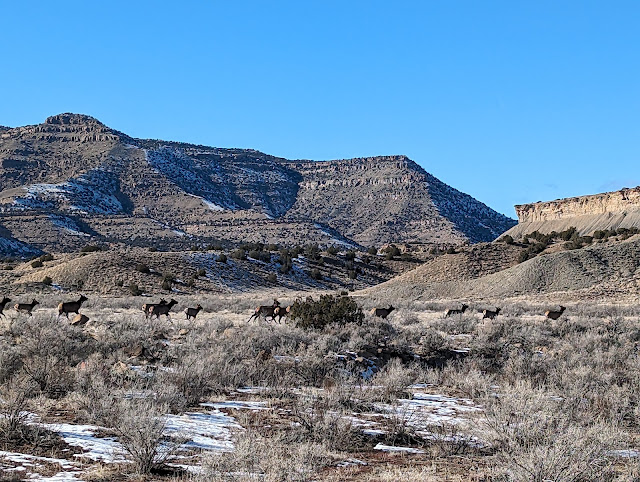 |
| Elk! |
As I cried, I heard a high-pitched whine, punctuated by wind gusts. The sound wasn’t unlike the “dee dee dee” song of a chickadee. I jerked my head around. There was nothing for miles but sand and sage. Confused, I looked up. Directly over me, not more than 100 feet off the ground, was a small red airplane that I hadn’t noticed before. It had approached from the east where headwinds masked the sound. As the plane passed overhead, the pilot tipped one wing toward me — that unmistakable friendly maneuver. I waved back in awe. Where did this airplane even come from? We weren’t all that far from airstrips in Fruita or Moab, but in my fragile mental state, I felt like a marooned astronaut on Mars interacting with a spacecraft from Earth.
“Dad loved flying over the desert in small planes,” I thought. This image filled me with intense relief and joy. It doesn’t really matter what I believe about spirits or an afterlife; just telling myself this story helped me feel immediately better. Buoyed away from my slow-rolling panic attack, I continued pedaling north with purpose.
The bike ride didn’t cure me, though. Not by a long shot. I continued to make inexplicable choices. In a fluster of frustration after learning I’d forgotten my laptop, I didn’t end up buying anything for breakfast in Colorado and neglected to eat during my 32-mile ride in eastern Utah. Suddenly it was 5 p.m. and I felt alarmingly dizzy while driving down Spanish Fork Canyon. Just a half hour from my mom’s house, I pulled into an overwhelmingly crowded shopping center to buy a Subway sandwich. After ordering, I tried to ask for a napkin but forgot the word for napkin. It didn’t come to me in time. I finally just mumbled “never mind” and walked out the door in a fluster of shame.
 |
| What I wouldn't give for this sort of focus. |
Christmas with my family was good but hard. Holidays are hard. My mom wasn’t in a great place to celebrate, and I don’t blame her. My sister whipped up a fantastic fondue dinner. It was fun to be around the excitement of four children on Christmas Eve. We stayed up past midnight completing a puzzle; I mostly just stared off into space while my mom and sister furiously worked. My sister put me up in my 4-year-old nephew’s room, a warm and dark space with a miniature bed and a Jesus night light. There I collapsed into my best sleep in weeks, before or since. I slept through Christmas morning, which I regret, but also … I needed that sleep.
 |
| My sister and I did hike to the top of Grandeur Peak on Dec. 26, which was really nice. |
The sleep didn’t cure me, though. Not by a long shot. I realize weeks have passed since Christmas and I am still struggling. I have been taking steps to address my tenuous mental state. I reached out to a telehealth counselor and scheduled my first sessions (I had been holding out for a local therapist that I could visit in person, but it has become clear that no one is available now or anytime soon.) I joined a gym so I can work on my mind-body connection through strength training and yoga. I make time for at least some meditation and stretching during the day. I’m open to trying new things. I need to try new things.
Specifically, I need to work on building my resilience. I need better ways to weather life’s disappointments and losses. I need to let go of my reliance on novelty and excitement. I need to move away from using physical exhaustion as my best coping mechanism, and embrace more sustainable practices — gratitude, presence, and acceptance. I can’t bear to exist in a universe that has no purpose or meaning; the only way to muffle the siren call of nihilism is to create purpose and meaning for myself.
I don’t know what that is. If it were easy it would be … endurance racing. But this is life. There’s no straightforward beginning or end, no immutable achievements or consequence-free failures. It’s challenging and bewildering and painful and there’s no reward in the end … just an end. It’s accepting that the little joys are enough. It’s realizing that life is incredible and life is enough. I still have a long way to go to get there.
I see why I imagine myself as a tiny bird, my dad as a tiny plane, bound to everything and nothing, soaring through the sky. It’s something beyond life to take comfort in. Sometimes it feels like the comforting things I once took for granted have gone away. I can imagine the perfect silence in Alaska but I can no longer rely on an airline to take me there. I can visit my family in Utah but can’t avoid an anxiety meltdown when I-70 closures trap me in standstill traffic. I can cultivate gratitude for the present but can't muster faith in a better future. I can resolve to fix my life but no longer trust my brain. I can’t even trust my brain to remember the word for napkin. I can ask my dad for help, but …
My dad’s birthday was Friday the 13th. He would have turned 70 years old. I was having a really hard day. I barely slept. My anxiety had spiked to the point that morning dread made it almost impossible to get out of bed. But I needed to get my monthly allergy shot. I hate allergy shot day. The shots make me feel lousy on my best days. I usually try to self-soothe with something. On this day, a hike seemed appropriate.
I pulled up to the tiny Cragmoor trailhead and stepped into a blaze of sunshine. It had been overcast for much of the morning, but the sun emerged nearly in line with the strike of noon. It was 54 degrees. Despite days of melting heat, the trail was still a friendly mixture of dry dirt along the mesa and packed snow in Fern Canyon. The type of conditions where one can strap microspikes to their shoes and fly. But I felt too heavy and sad to fly. I tried to focus on my favorite memories but found myself mostly just missing my dad.
For a while my brain shut down as I trudged upward through the woods — slogging is my best coping mechanism. Suddenly I emerged in the sunlight on top of Bear Peak. There wasn’t a breath of wind. It was so warm. Dad would have loved this January day. The sound of his laugh came to me: A visceral memory from the evening Beat and I were married on Bear Peak in September 2020. Dad was dealing with a painful back injury for which he had surgery just two weeks later. I didn’t know the extent of his pain because I hadn’t seen him in nearly a year. He could barely walk. But he pulled himself all the way up this mountain just for me, so I could have the mountaintop wedding I’d dreamed of. He never showed a hint of pain … just an abundance of happiness. The memory of his smile evoked a sense of peace I hadn’t felt since that little plane over Harley Dome.
Two hours later, a nurse injected my arms with poisons I have been intentionally taking for more than six years. I sat in the waiting room for the mandatory half-hour it takes to ensure I wasn’t going to lapse into anaphylactic shock. While dizzying serum coursed through my blood, I wrote up a stilted Facebook caption on my phone so I could share my photo of Bear Peak with loved ones. I still can’t do a better job to describe the experience, so I’ll record it here:
You would have turned 70 today.
I carried your memory up Bear Peak.
That heaviness on my chest,
a weight so familiar now.
50 degrees and sunny.
You would have loved this day.
Just like that day in September 2020.
We were together again after so many months of resolve to stay apart.
It was my wedding day.
You were hurt; you were in so much pain.
You didn't tell me.
You wouldn't let us change our plans.
You dragged yourself up this mountain.
Sunset that night was stunning.
The clearest evening in weeks.
You looked so happy, so proud, your smile shining through the fading light, through all of your pain.
I fear with each passing day I forget something else, but I will never forget that moment.
We were together and full of hope.
Now on your birthday I'm here alone.
With all of life in front of me.
 |
| Niwot Ridge — like Alaska, a place so harsh that it becomes comforting in its simplicity. |
Maybe I’m past my charmed years, when nice things seemed to come more easily, and my greatest source of comfort was alive and climbing mountains for me. But it’s not over. There's still life in front of me.






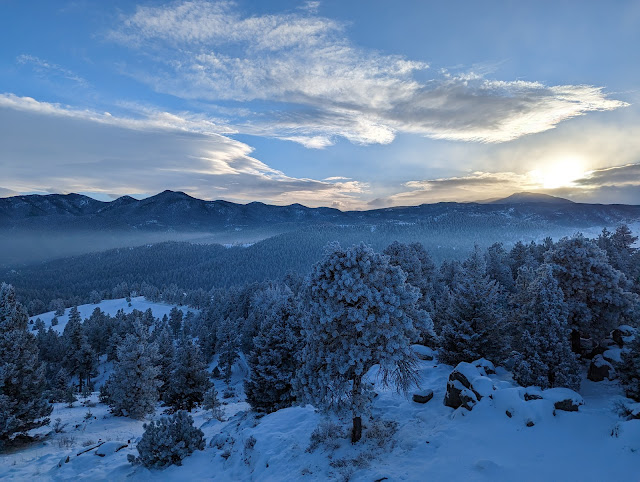



.jpg)
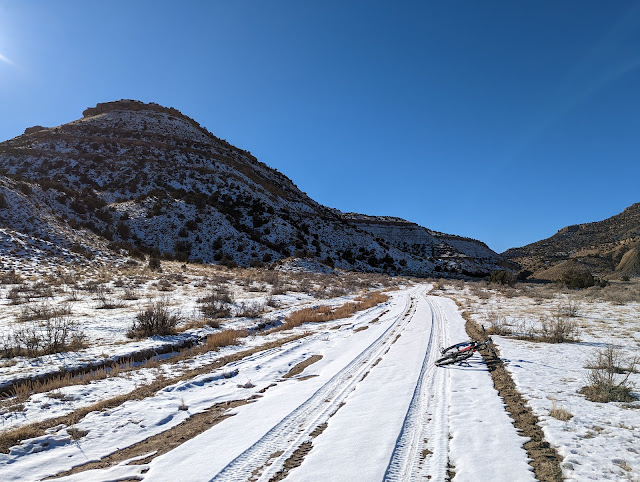
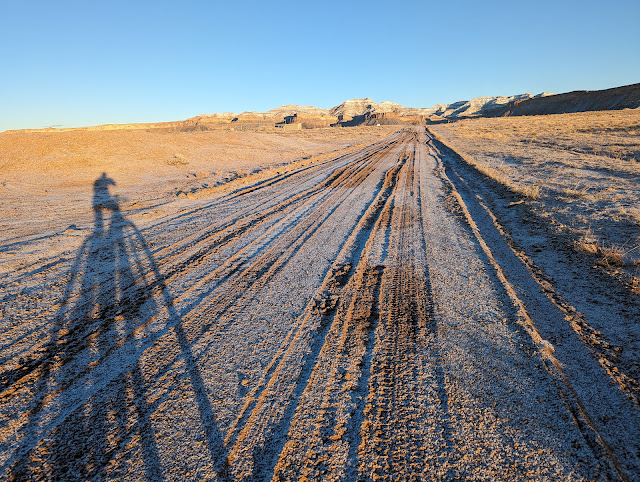
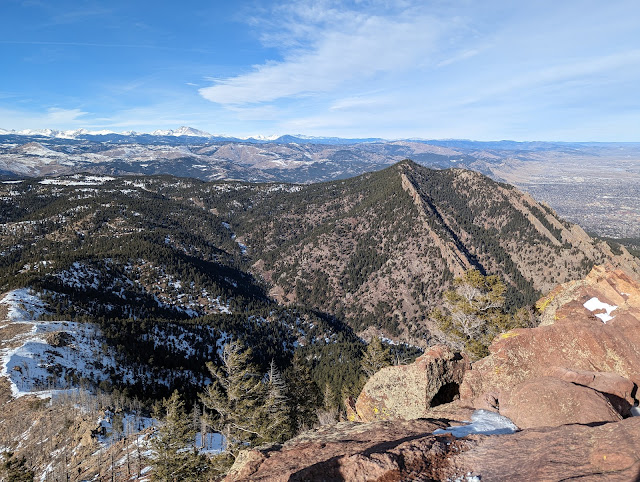
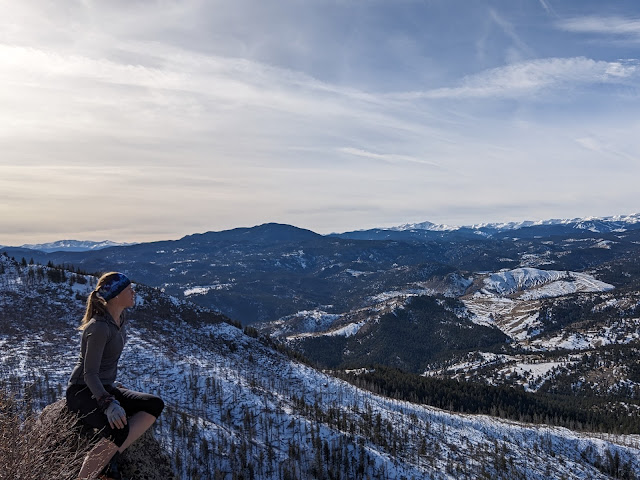
Gratitude has been my new go to this year.
ReplyDeleteI hope you are able to figure out what is going on. I feel like things have been sideways for a while, at least for me, and the pandemic didn't make it any easier. Sending good thoughts to you and a bit of peace (and hopefully sleep).
ReplyDeleteLife is a gift Live in the moment
ReplyDeleteHi Jill, I wonder if you’ve looked into post-concussion syndrome after you tangled with that truck. A friend of mine struggled for almost a year with various and disparate symptoms after a seemingly-minor bike accident. She didn’t think she had been concussed until a new therapist made sense of her spiraling state. I hope you are able to feel better soon.
ReplyDeleteWhat a wonderfully poignant post. It's funny you mention the "mental health bench." There are a few nature preserves I hike at, and in the recent past, when I found myself back in the dark mental place I know too well, I would hike there and long to get to the bench along the river. Not to rest, but to close my eyes, feel the cool air on my face, listen to the river meandering by, and the birds—including the chickadees—chirp. Keep doing what you're doing; you'll get there.
ReplyDeleteThank you for sharing, Jill. Raw and brilliant per usual. Relating in many ways.
ReplyDeleteWell. I can relate to a lot of this. I did not go on my usual Grand Canyon NewYears backpacking trip for the first time in years because: storms. Airlines. And I'm feeling it. But this feels self indulgent to whine that I need more adventure. Obviously what I've been told is true: I need more indoor hobbies.
ReplyDeleteYou might be resilient but in a different dimension than what society expects of us. I used to feel so much shame about my tearful outbursts, my inflexibility, my obsession with detail at the expense of the bigger picture. At some point in 2021 I found that neurodivergence (ADHD and autism) resonated with me. I never felt the need to get a diagnosis, but it put my entire life into perspective. I could let go of the shame and self-loathing and wondering why some things in life are so difficult for me when they "should" be easy. It can be a hard trap to fall into, especially for those of us who are gifted in other ways, we think "what is wrong with my brain?"
ReplyDeleteAlso grief has no timeline, as I'm sure you've heard. I'm still processing the gruesome death of my father, nearly 29 years later. Wishing you some restful moments. Love your writing as always.